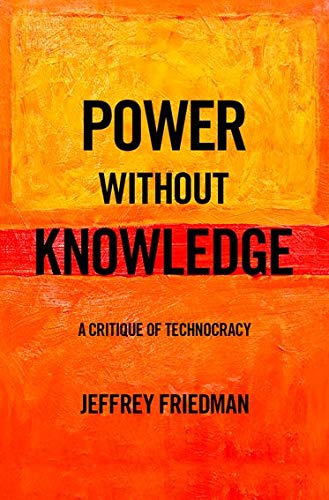

One (seemingly) obvious solution to inadequate voter information is something like a market approach—an epistemic division of labor accompanied by a marketplace for enlightenment. Can this process ameliorate the knowledge problems faced by a technocracy?
Friedman is skeptical. Here I focus on two problems he raises. One is the problem of too much rather than too little information. The other is the problem with radical rather than rational ignorance.
Friedman reviews the substantial literature showing that voters’ understanding of even basic political facts is palsied at best, dryly noting that as one “reads the more recent scholarship, it sometimes seems as if researchers have been trying to outdo one another in expressing their discouragement at the breadth and depth of the public’s political ignorance.” This seems to suggest an obvious solution—a better informed public, and “researchers’ tacit (and often explicit) assumption has been that if people would just get more political knowledge into their heads, they would make reliably good political decisions.”
But this would suppose the problem is too little information. In reality, the problem is that there is too much information. For all practical purposes, we are drowning in an overabundance of information, and no person can gather more than the most miniscule fraction of it. Throughout Friedman’s book, the figure of Walter Lippmann looms large, as does his work on information problems of civilization. Friedman approving quotes Lippmann as saying:
Lippmann wrote these words around a century ago. Since then, the quantity of available information and the ease with which it can be accessed have increased to a degree that few could have imagined. And yet, the capacity of the human mind hasn’t changed. Inevitably, as society grows more complex, each of us grows increasingly more ignorant of how society works. You can’t solve a problem caused by superabundant information with even more information. Our understanding will inevitably be limited to our fallible interpretations of the hopelessly tiny fraction of information we can manage to acquire.
But if solution isn’t more information, maybe it’s ensuring that we have the right information? This is where the problem of radical ignorance raises its head. Friedman thinks the idea of rational ignorance (that we deliberately decide the relevant information isn’t worth the cost of acquisition) is drastically overrated, and the real issue is radical ignorance—the things we don’t know that we don’t know. Deciding that the relevant information isn’t worth acquiring presupposes that you already know in advance what the relevant information would be, before you’ve acquired it.
Simply telling people to use reliable sources to acquire the best information from the most qualified experts only hand-waves away an enormous amount of epistemic complexity that renders such advice functionally useless. This is due to an unavoidable “part of the human condition, insofar as human beings are ignorant—that is, insofar as the truth is not self-evident.” Friedman goes on to note:
One might pin their hopes on a form of competition helping consumers find the best information. Unfortunately, this wouldn’t work, Friedman says. The process of economic competition has mechanisms that tends towards progress even with radically ignorant consumers. In an economic market, consumers can judge if the final output they receive is satisfactory or not and can exert selection pressure against firms producing unsatisfactory products. This allows consumers in the market to “serve as anchors to reality and, therefore, as checks against dysfunction in the division of economic labor. This functionality of the system is ensured, however, only insofar as consumers are able to distinguish adequately between satisfactory and unsatisfactory products.” This is what breaks the analogy between an economic market and a market for political information:
Attempting to outsource the process of selecting the “right” information by having journalists present information from the “best experts” runs into similar problems:
Even stipulating the existence of ideal epistocrats who can successfully solve the knowledge problems of technocracy, the problems of radical ignorance remain systemic:
Still, all of these problems are secondary to what Friedman sees as the most fundamental obstacle to an effective technocracy—ideational heterogeneity. That will be the topic of the next post.
Kevin Corcoran is a Marine Corps veteran and a consultant in healthcare economics and analytics and holds a Bachelor of Science in Economics from George Mason University.

Comments are closed.